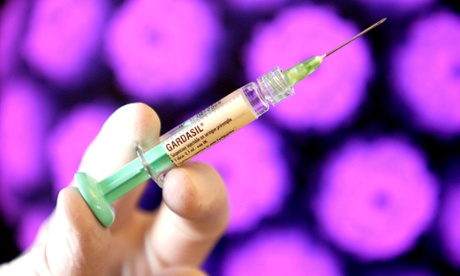
When it comes to impulse buys there are limits. A £2.50 almond croissant? Oh go on then. A £20 knitted scarf? Tempting. How about a £400 HPV vaccine that could save your life? Ah.
Human papilloma viruses (HPV) are common - many people pick up an infection and shake it off, unaware, over their lifetime. But not all infections are benign - HPV infections can lead to cancers including those of the cervix, penis and throat and cause genital warts. So it’s no surprise that when a vaccine was developed to protect against a group of the ‘high risk’ strains, it was seen as a huge medical advance. Launched in 2008, the HPV vaccine has been offered routinely to year 8 girls (aged 12-13), with those under the age of 18 also able to access the vaccine free of charge. Currently there are two vaccines on offer - one covering two strains of cancer-causing HPV, the other also including protection against genital warts. The theory is that vaccinating girls will not only protect them but also indirectly protect boys.
But amid the massive public health campaign to, quite rightly, encourage girls to embrace the vaccine there is a lack of coherent information over the provision for ‘older women’ – which, given that this applies to all those aged 18 and over, means we can dispense with the Mrs Robinson terminology and simply read that phrase as women, full stop.
That the vaccine is not routinely offered to us is not a huge surprise. The vaccine doesn’t treat HPV so the aim is to give it to girls before they are likely to have had an infection – in other words before they become sexually active. As Dr Philip Castle, Executive Director of the Global Coalition against Cervical Cancer, explains, “It is not that HPV vaccination in older women can’t help - just that fewer women will actually gain a benefit.” And given that the HPV vaccine isn’t cheap, it’s not unreasonable that the government draws a cost-effective line somewhere.
But while on a population level this makes sense, for individuals it is not so clear cut. In fact older women, and men, can access the vaccine provided they have some ready cash to spare – the going rate is around £400. It’s not something that is shouted about - the NHS web page devoted to the vaccine says nothing about availability for adults, while Cancer Research UK, although mentioning on their page that the vaccine is available privately, doesn’t make clear that this doesn’t just mean for adolescents. When I asked an expert at Public Health England whether there was currently any guidance for women aged 18 and over who are considering private vaccination, the reply was simple, “As far as I was able to find out, there is currently no advice on this topic.”
Yet it is not unreasonable for individuals outside the public health programme to think - ‘Hang on, what about me?’. After all, cervical cancer is the second most common cancer for women under 35, and while women now aged 24 had the chance to get the jab six years ago many might have missed the boat. Professor Alison Fiander, head of the HPV Research Team at Cardiff University School of Medicine, shed more light on the situation. Whether it is worth saving up and shelling out, she says, depends very much on individual circumstances and sexual history. But while the general message is that the vaccine is ‘less effective’ for older women, for some it could still offer benefits. “It will be effective and protect against future HPV infection if they [the patient] aren’t already infected with HPV. Even if they have been infected with one HPV type it may protect against another type, since the vaccines protect against more than one type of HPV,” Fiander says. “I guess if you are talking about women in their twenties then there is still a good chance that they will get some protection from it.”
But if you do plump for the jab - and let’s be clear, I’m not advocating either way - it’s not the end of the story. “The important thing is if they have already started having intercourse then they need to know that the vaccine may be less effective if they have already got HPV and therefore they must carry on with cervical screening,” says Fiander. “What we don’t want is for women to go and get vaccinated think ‘oh right I have got no risk now’ and then give up on cervical screening.” After all, there’s no simple blood test for HPV and, as Fiander points out, the HPV strains covered by the vaccine account for only 70% of cervical cancers.
Whether or not it is cost effective to roll out vaccination to boys, men who have sex with men (MSM) - as current consultations are considering - or older women, everyone should be clear about the options and arguments, after all four hundred quid is no small sum and the choice is far from simple - it could be a total waste of money or the best you’ve ever spent. But informed choices rely on informed individuals - and that can only come from easy to find, clear and reliable public information that help people to ask the right questions. This is one buy that shouldn’t be left to impulse.

